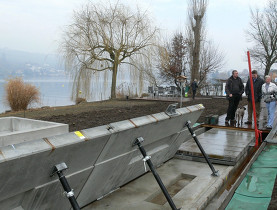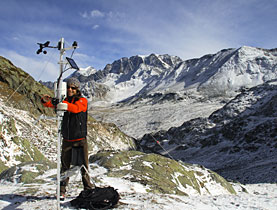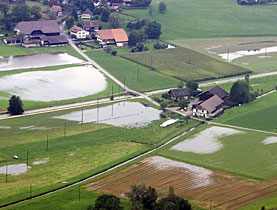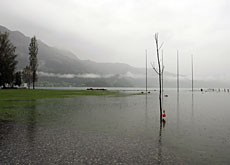Is Switzerland ready for the next flood?

Heavy rainfall in mid-April and large amounts of snow still lying in the Alps show that Switzerland must be ready to expect a deluge.
The country has been hit by serious flooding three times during the past nine years. Experts say preparedness has improved over this period but much more progress is needed.
Areas north of the Alps received up to 80 litres of rain per square metre on April 21 and 22, causing some flooding in eastern Switzerland.
In some ways, the country was fortunate the low-pressure system swept over Switzerland when it did, since the large amounts of snow in the mountains had not yet started melting.
Measurements taken in the last week of April showed snow depth on the north side of the Alps between two and four metres, the fourth-highest amount recorded at this time of year since 1936.
Another period of heavy rain in May, combined with above average temperatures as have been forecast by the national weather service, would lead to high runoff from the melting snow and could result in severe flooding.
“It would be most dangerous if we get intense rainfall up to an altitude of 2,500-2,800 metres,” Christine Pielmeier of the Swiss Federal Institute for Snow and Avalanche Research Davos told swissinfo.
“A lot of energy input [high temperatures] and water input into the snow pack could potentially lead to increased melt and high runoff amounts,” the researcher said.
Worse to come
Another reason the Swiss have reason to be on alert is a recently published study commissioned by canton Bern. It said floods in future could be worse than the 1999 event or the natural disaster of 2005. The latter caused more than SFr2 billion ($1.93 billion) in damage.
The report said global warming was increasing the likelihood of periods of intense rainfall.
In the worst-case scenario, large areas of the canton could be under water for weeks, damaging infrastructure such as power plants and sewage treatment facilities as well as cutting off entire valleys.
Also cause for concern is the fact that the authorities still do not have a big picture of all the areas potentially at risk. So-called hazard maps being prepared by each canton will not be complete before 2011.
The maps are key to limiting flood damage, says Adrian Aeschlimann of the Federal Environment Office. No permits will be given for new buildings in high-risk zones and the onus will be on the communal and cantonal authorities to ensure that existing structures located in these areas are reinforced to withstand floods.
Another aim of the maps, Aeschlimann said, is to “sensitise the population in areas where there is the potential for flooding”.
Disaster response
The maps are part of an integrated risk management system, supported by the Swiss government to improve disaster response and relief.
Aeschlimann stresses that Switzerland is better prepared than it was ten years ago, but still has work to do.
“We should make every effort, for example, to control the flooding so that less vulnerable areas instead of inhabited and industrial zones are under water,” he explained. This is a condition for granting additional federal subsidies.
The regional authorities should also be prepared to share the costs in cases where rivers run through several cantons. In the past, those downriver have accused cantons upriver of opening their sluices and dams, allowing too much water to flow through too quickly.
Swiss Re, one of the world’s leading reinsurers, says the high cost of flood damage claims over the past few years has eaten up some of the reserves of the country’s insurance companies.
Peter Hausmann, head of research and development for catastrophe perils at Swiss Re, told swissinfo this had led to an increase in the own-risk portion of losses that the insured have to pay, and could eventually lead to higher premiums.
However, he said Switzerland was better prepared for natural disasters than most countries.
“There were far fewer and less severe claims from last year’s flooding because we already knew where the most susceptible places were, and had equipment and material such as sandbags at the ready,” Hausmann said.
“We have learned from every event and there has been a lot of progress since 1999,” Aeschlimann concluded.
swissinfo, Dale Bechtel
In the case of extreme weather or serious earthquakes, the National Alarm Centre sends the alerts of the Swiss Meteorological Office or the Swiss Seismological Service to the affected cantons, the army, the Federal Police Office and other parties.
The alert to the population is communicated by the 7,750 sirens spread across the country and normally operated by the cantonal police.
The population is then supposed to tune in to the radio stations of the Swiss Broadcasting Corporation for information.
August 2007: Flooding. Total cost not yet known.
June 8, 2007: Three people died in flooding in Huttwil and Eriswil (canton Bern).
August 21-23, 2005: Eight people died after heavy rainfall and flooding in Bern and east and central Switzerland. Many road and rail connections were washed out, with the villages of Engelberg and Lauterbrunnen cut off. The damage came to SFr2.5 billion.
October 14/15, 2000: Persistent rain in canton Valais led to landslides and flooding. Sixteen people died, including 13 in the village of Gondo. The bill came to SFr500 million.
May 15, 1999: Damage estimated at SFr580 million was caused after storms in several regions, including Bern, Thun, Rheinfelden and Lake Constance.
September 24, 1993: After heavy rainfall, the River Saltina burst its banks, causing severe damage in the town of Brig. Two people died, with damage estimated at SFr600 million.
Summer 1987: Eight people died after storms in Poschivao and the Reuss plain in canton Uri. Damage totalled SFr1.3 billion ($1.09 billion).

In compliance with the JTI standards
More: SWI swissinfo.ch certified by the Journalism Trust Initiative




You can find an overview of ongoing debates with our journalists here. Please join us!
If you want to start a conversation about a topic raised in this article or want to report factual errors, email us at english@swissinfo.ch.